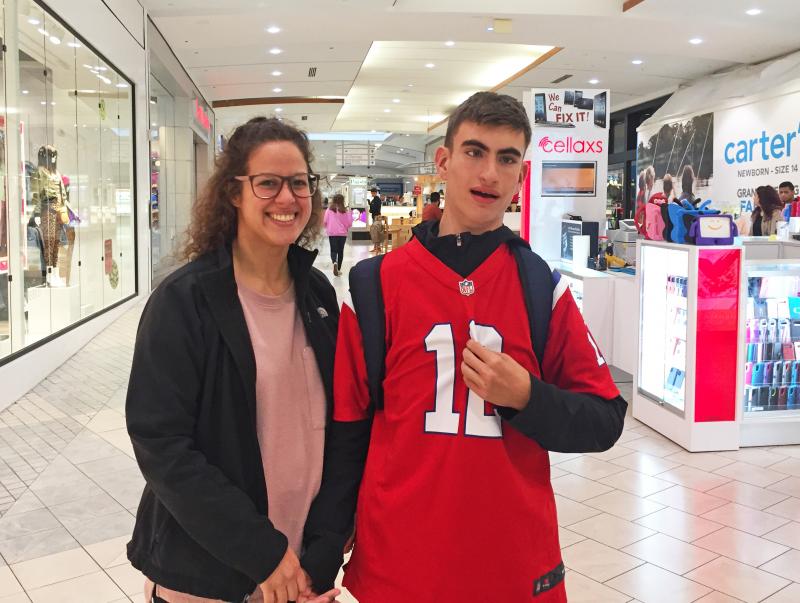Support worker makes a difference for Dartmouth family
Like many Dartmouth teenagers, Liam Amaral can be found at the mall on a Friday evening checking out the sports apparel.
The fifteen-year-old particularly likes the shirts and hats emblazoned with the Patriots logo — the Patriots are one of his favorite teams — and enjoys picking out clothing for the other members of his family.
“He has all these age-appropriate interests, he’s very empathetic, he loves his family, he’s super sentimental,” said mom Kathleen Amaral. “We know all these things about him. But he doesn’t talk.”
Liam has an extremely rare subtype of congenital disorder glycosylation, or CDG, a rare genetic disorder that affects his cellular metabolism.
So unlike other Dartmouth teens, he doesn’t use full sentences to communicate. Instead he uses short words and gestures to get his point across.
But Sara Wazlowski seems to understand him just fine.
“He says little words, but he tells a story,” she explained. “So when he says ‘Dad,’ he means ‘I think Dad would like this.’”
Wazlowski is a disability support worker who has known and worked with Liam for over a year.
“He’s my favorite,” she said with a grin.
The New Bedford native started off as an intern at the Schwartz Center for Children before meeting the Amarals through her work with Better Community Living, a North Dartmouth non-profit that provides services to people with autism and developmental disabilities.
She is currently completing a master’s degree in Applied Behavior Analysis, which helps patients who are non-verbal improve social behaviors, including communication skills.
And Wazlowski just wants the people in her care to be treated like people.
“People see a person with any type of disability and they tend to like do a baby voice, and stuff like that, which I’m not really a fan of,” she said.
“I get it. You want to be nice to them...But just talk to them as if you were talking to somebody else you just met.”
The constant staring also bothers her. “I just wish there was a little more awareness about disabilities, like teaching your kids that there are people in the world that are different than you,” she said.
Kathleen noted that most teenagers should have some time away from their parents, and Liam is no exception.
“As he gets older, despite how bright we know he is, and how funny he is, and how amazingly talented he is...The truth is that due to his disability he does require one to one support,” she said. “So where Sara comes in — just having someone to take him out allows him to be a little bit like another teenager.”
And Wazlowski is often invaluable support even when the family is present.
When Liam’s sister Emma was inducted into the National Honor Society, Kathleen said, “We weren’t sure if Liam would sit still, if he’d be quiet the whole time, if it’d be difficult for him to sit through a ceremony like that.”
But she said that Emma really wanted him there. “So we had Sara bring him and meet us there, and they sat with us.”
“Just having her there to support him, he sat through the whole ceremony,” she added. “I know for a fact had she not brought him...he wouldn’t have been able to sit through the whole thing.”
Wazlowski noted that disability support workers are often underpaid and overworked.
She is used to earning just $12 to $13 an hour in as many as four part-time jobs, all while completing her master’s degree.
But for her, it’s worth it.
The best part of the job, she said, is seeing the changes that a support worker can bring.
“You open up a whole new world of functional communication,” she noted with a smile.
“[Kids] all of a sudden tapping your shoulder and asking for your attention instead of yelling and screaming their head off. Just little things like that, realizing that you’re literally changing the impact of the rest of their lives.”












